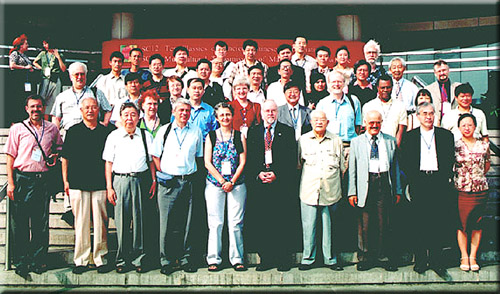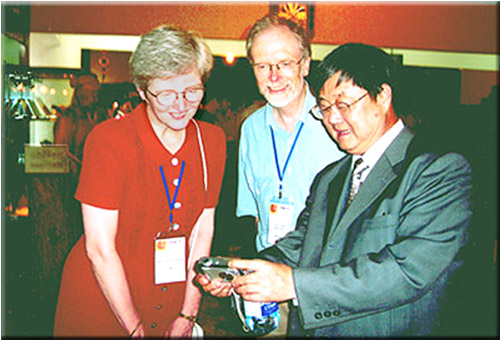The ICHM at the International Congress for the History of Science in Beijing, 24-30 July, 2005
The ICHM enhanced in a number of ways the intellectual and social activities associated with the International Congress for the History of Science held in Beijing during the week of 24-30 July, 2005.

The ICHM contributed to the intellectual program through three ICHM co-sponsored symposia. Joseph W. Dauben (USA), GUO Shuchun (China), and Alexei Volkov (Canada) organized a session on the "Ten Classics of Ancient Chinese Mathematics" that was held on Monday, 25 July, 2005 at the China Museum of Science and Technology. That session, opened by words of welcome from the Museum's Director Dr. WANG Yusheng, consisted of three subsessions, one in the morning and two running concurrently in the afternoon. The speakers and their titles were:
The Monday morning session:
- Christopher Cullen (UK): "Introduction to the Symposium"
- WU Wen-Tsun (China): "On the Development of the Real Number System in Ancient China"
- DU Shiran (China): "Jun Shu, Fang Cheng, and Others"
- LI Di (China): "On the Approach to the Study of the Ten Treatises of Mathematical Classics"
- Karine Chemla (France): "How does the Suanshushu Contribute to Our Understanding of the Nine Chapters on Mathematical Procedures and their Commentaries?"
- GUO Shuchun (China): "Some Questions for the Ten Classics of Ancient Chinese Mathematics"
- Alexei Volkov (Canada): "Ten Classics and Mathematics Education in Traditional China"
- Jean-Claude Martzloff (France): "The Mathematics Known in China during the Tang Dynasty Is in No Way Limited to What Is Contained in the Suanjing Shishu"
The Monday afternoon session (A):
- DUAN Yaoyong (China) and Kostas Nikolantonakis (Greece): "The Origin of Algorithm Extraction"
- GUO Shirong (Korea): "The Ten Treatises of Mathematical Classics in Korea"
- Andrea Bréard (Frnace): "Where Does the History of Chinese Statistics Begin?"
- XU Yibao (USA): "David Eugene Smith and His Study of the Ten Classics of Ancient Chinese Mathematics"
The Monday afternoon session (B):
- ZHOU Hanguang (China): "The Influence of Confucianism on Ancient Chinese Mathematics Reflected in the Ten Classics of Ancient Chinese Mathematics"
- WANG Qingjian (China): "Ten Classics of Ancient Chinese Mathematics and Education of History of Mathematics"
- LI Zhaohua (China): "A Study on the Xiahou Suan Jing"
- SUMIKO Kobayashi (Japan): "A Comparative Study of the Arithmetic of Fractions in the Nine Chapters of Mathematical Procedures and Japanese Textbooks in Mathematics"
- GUO Jinhai (China): "The Teaching of the Ten Classics of Ancient Chinese Mathematics in the Main Government Schools during the Late Qing Dynasty's Self-Strengthening Period"

SASAKI Chikara (Japan) and Roshdi Rashed (France) co-organized a session also held on Monday morning, 25 July at the China Museum of Science and Technology on "Multicultural Transmission of Mathematical Knowledge." Their program included the following speakers and talks:
- MIURA Nobuo (Japan): "Leonardo Fibonacci As the Transmitter of Arabic Mathematics into Europe"
- Albrecht Heeffer (Belgium): "The Regula Quantitatis or the Invention of the Second Unknown"
- José Antonio Cervera (Mexico): "Methods of European Calculation in China and Mexico during the 17th Century: A Comparative Study"
- Edith Dudley Sylla (USA): "Jacob Bernoulli's 'The Art of Conjecturing' and Its Roots in Islamic Law and Mathematics"
- Wuyunqiqige (China): "The Adoption of Western Arithmetic in Meiji Japan's School System of 1872"
- FENG Lisheng (China): "The Cultural Interaction between Chinese and Japanese Mathematics in Modern Times, 1850s-1920s"
- SASAKI Chikara (Japan): "Towards a Truly Oecumenical Historiography of Mathematics"
Finally, LI Wenlin (China), QU Anjing (China), and Benno van Dalen (Germany) co-organized a session entitled "Along the Silk Road: Mathematical and Astronomical Exchanges between East and West in Ancient and Medieval Times." This session took place on Thursday morning, 28 July at the Institute of Mathematics of the Chinese Academy of Sciences. Its program opened with an address by WU Wen-Tsun that was followed by:
- JI Zhigang (China): "Needham's 19(j) and Fibonacci's Liber abaci"
- Françcois Charette (Germany): "Patronage and Science in Central Asia around 1000 CE: A Reassessment of al-Buruni's Formative Years"
- Saeed Hashemi (Iran): "Connection of Old and New Mathematics on Works of Islamic Mathematicians on the Silk Way"
- Ilham Yusup (Turkey): "Some Studies on Al-Kashi's the Key to Arithmetic"
- KOMATSU Hikosaburo (Japan): "Zhu Shijie, the Teacher of Seki and Takebe"
- Jean-Claude Martzloff (France): "The Diffusion of Astronomical Parameters from Huihui Li to Japan"
- B. S. Yadav (India): "Filling in the Gaps: Indo-Chinese Exchanges in Mathematics"
- QU Anjing (China): "Thought But Not To Speak Out: A Scientific Tradition in Old China"
In addition to these symposia, the ICHM also held its quadrennial general business meeting on Monday, 25 July at the China Museum of Science and Technology. The highlight of that meeting was the official announcement of the recipient of the fifth Kenneth O. May Medal and Prize, Henk Bos (The Netherlands). Although generally the May Medal is presented at the International Congress for the History of Science, this year it was actually presented in Utrecht, The Netherlands on 30 June (see the webpage for the citation and for photographs). The citation has also appeared in print in Historia Mathematica vol. 32 (2005), no. 4.
Thanks to the beneficence of Elsevier, the publisher of the ICHM's journal Historia Mathematica, the ICHM was also able to enhance the purely social aspect of the International Congress by hosting on the evening of Monday, 25 July, a dinner/reception for historians of the mathematical sciences at the China Museum of Science and Technology. Some one hundred historians from dozens of countries attended this event, and we feel confident that many new professional friendships were established during the course of the evening.
The ICHM looks forward to continuing its active participation in the quadrennial gathering of the International Congress for the History of Mathematics at its next meeting to be held in Budapest, Hungary in 2009.